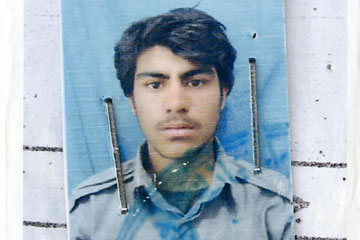
This photocopy of an image of Abdul Razaq, the killer of the three Marines, was given to the writer by a Marine in Helmand.
(4 of 12)
His work changes. He gets a job guarding trucks. It is possible Abdul Razaq works for one of the 50-odd security companies registered with the government, but it is equally likely he is a gunman for one of the many that are not. Both kinds are employed by the coalition. Both are subject to investigation and outrage when it becomes clear that they regularly bribe Taliban to get NATO convoys from one place to another. When Abdul Razaq works with a security company, he is close to both sides of Afghanistan's war without military oversight from either. And he is not the only one in a potentially confusing situation. Much of his nation's leadership is explicitly, publicly ambivalent toward the coalition.
The various Afghan national-security forces are supposed to review a man's life before allowing him to enlist. One official responsible for the vetting process is the head of recruiting for the Afghan National Army, Mohammed Akbar, a brisk, hale colonel. More than a dozen men squat in the hallway outside his large corner office, looking more like prisoners than potential recruits. In fact, the colonel explains, they are soldiers accused of disciplinary infractions. The most typical infraction is absence without leave.
"But if you sent everyone who went AWOL away," says the colonel, "there would be little army left."
Akbar puts a thick folder on the table in front of him and clears his throat. "Article 97 of the constitution," he begins, "says, 'If a man is not an addict, disabled or criminal, he is allowed to be a soldier.'" He flips to an example and takes his time explaining the process. The smudged paperwork is extensive and much handled, requiring multiple guarantors, personal histories, fingerprints, photographs, interagency cooperation.
"We were not always so thorough," he concludes, closing the folder. "But it has been this way since 2010. If Abdul Razaq was ever here, we would know. There is no question about this." He says he believes in transparency. The colonel then walks into the courtyard of the Kabul Military Training Center for a smoke. His office is not far from the dormitories where the recruits sleep. Their balconies are empty, and I don't look at them twice. It is not for several weeks that I will obtain the picture of Abdul Razaq standing upon one of them.
In Summer 2010, after his stint as a mercenary, Abdul Razaq joins the Afghan National Police in Nawa district, just south of Lashkar Gah. The officer who recruits him, leaving no paperwork behind, is Sayfullah Khan. Soon Sayfullah becomes district chief of police in nearby Girishk, and Abdul Razaq becomes one of his six bodyguards. This is a good job, an honor for a farmer from Musa Qala. Much better to be at district headquarters with the chief--especially one like Sayfullah Khan, who is regarded as a strong patron--than on some remote base where Taliban attack nightly. But it is dangerous in a different way. Abdul Razaq cannot read the U.N. report on the 462 assassinations in Afghanistan in 2010, but he knows that district police chiefs are highly favored targets, and it seems as if someone is assassinated every day.
